WHERE IS THE ENTHUSIASM?
ATR. WYNDHAM'S walk over the course at Dover yesterday, if it proves, as we think it will prove, to have been a walk-over, was sufficiently remarkable. There was a considerable, but by no means an overwhelming majority for the Conservatives at the last contest, and though there was no contest in 1886, yet if the enthusiasm for Mr. Gladstone's proposals had been rising so steadily as we are assured by the Home-rule Party, surely some one would have been found to test the feeling at Dover, and to show that, at any rate the special discouragement of 1886 had passed away. Dover is to some extent a critical political point in the island. If the proposal to loosen the ties between the Kingdoms of Great Britain and Ireland is thought to be dangerous, no doubt that spot on our shores which is nearest to the Continent, and therefore most exposed to attack,—which, indeed, Sir Edward Watkin is always endeavouring to persuade us to link to the Continent by a submarine railway,—would be most sensitive to the dangers of that proposal, and for that reason most likely to repudiate Mr. Gladstone's plans with warmth and decision. We do not wonder, then, that the Gladstonians think Dover a specially unpropitious place for a contest, and one in which they might incur a worse defeat than in almost any other. But just for that very reason, if the enthusiasm for Mr. Gladstone's policy had been rising, as it has been supposed to be rising, there would have been found amongst the chivalry of Home-rule some one to lead the forlorn-hope for Mr. Gladstone, and to declare that Dover ought especially to welcome a policy which, in the belief of the great leader and his chosen advisers, would make the United Kingdom more united and for- midable than ever, instead of more liable to disintegration. No such candidate, however, had been found up to yester- day morning, and thence we infer that the enthusiasm for Home-rule in England is by no means so deep as its friends tell us ; that it is, indeed, rather superficial and hesitating, and that when once Mr. Gladstone's inspiring presence is withdrawn, it will shrink into proportions altogether in- significant. Let us consider the reasons for the rather chicken-hearted state of mind, which betrays itself behind all the bluster.
The rank and file of the Liberal army do not believe that Mr. Balfour is the tyrant in Ireland whom Messrs. O'Brien and Co. represent him to be, otherwise they would rush forwards to break a lance with the private secretary of the man who personally represents the Unionist flag, and whose defeat would most seriously injure the Unionist cause. A contest in Dover would have been in a very special sense indeed a contest with Mr. Balfour, for the great recommendation for Mr. Wyndham is that he has acted as Mr. Balfour's private secretary, and has himself written not a few of those letters for which Mr. Balfour has been so bitterly reviled by the Irish and Gladstonian Press. Were Mr. Balfour really believed to be the ogre in Irish matters which he is represented to be, it would have been thought a distinction even to try to strike a blow at him, and a distinction which no good Gladstonian would fail to court to strike anything like an effective blow at him. But the cooler Gladstonians evidently feel the greatest possible misgivings on this head, and so do their supporters in the constituencies. And they are quite right in their misgivings. What, in fact, do they see P They see before them a Government which for one repres- sive measure which it has proposed and passed in relation to Ireland, has proposed many relieving measures, and continues to press relieving measures on the attention of Parliament. We are always hearing of generous railway proposals, drainage proposals, fishery proposals, which nothing but the jealousy of the Gladstonians themselves hinders from becoming laws. We see, again, an Irish Secretary who is the object of more violent abuse than any Irish Secretary since Mr. Forster, and who appears to be entirely indifferent to that abuse, and does not make it the excuse for a single prosecution. Again, what do we see as to the rationale of Irish coercion itself, as it is called ? We see a few prominent and distinguished Irishmen singled out for prosecution,—one or two singularly popular priests, and a good handful of the idols of the people who have been returned to the House of Commons, but hardly a man anywhere who is a nobody, and whose prosecution would excite no popular fury. All the repression is directed, as it ought to be directed, to those who really are responsible for the resistance to the law, the true advisers of the Irish people, not their mere creatures. This is even so notoriously the case, that Mr. Morley and agitators of his stamp seriously treat it as a fresh ground of offence, and seem to intimate that they would feel less anger against the Government if the men struck at were not Members of Parliament and not popular priests, but persons of no note at all. Yet what could be a more convincing proof of the courage and good faith of the Government than the fact that while private politicians of no note in Ireland are let pretty much alone, however vehemently they may rant, it is the popular men, the men whose advice is really potent, the men who are really responsible for the resistance to law, with whom the Government grapple ? Nothing amazes us more than the complaints which are made, that when a prosecution is needful, it is directed against those who have real influence in Ireland. Why, how could you have a more convincing guarantee of the good faith and frankness of the Government than the fact that they let the little men alone to do very much as they like, and challenge the men who are really strong in popular confidence, and whose action really sways the action of the larger masses beneath them ? Mr. Balfour could give no better proof that he is acting under a sense of duty. If he had prosecuted four undistinguished Irishmen for every distinguished Irishman, he would have had a com- paratively easy task. He has really done the reverse. He has singled out those for whose fair treatment the House of Commons takes the most anxious care ; and that is why the English constituencies, who love to see everything done above-board, do not believe the allegations concocted against him of mean and petty tyranny. His administra- tion has been just like his legislation. For every act of frank and avowed repression he has done many acts of kindly and generous forbearance. And the consequence may be seen in the actual state of Ireland. Of the few who are really expiating their resistance to the law, the greater number are men of some mark and influence.
But it is not only Mr. Balfour who has inspired confidence by his straightforwardness and lenity. It is the same with every English authority. There is the Speaker, always more reluctant to stop an Irish Member than an English, and in point of fact, according more license to Mr. O'Brien than he would, accord to Mr. Balfour himself. There is the Chair- man of Committees, who, Unionist though he be, is always severer with Conservative interruptions than with Parnellite interruptions. There is, again, Sir James Hannen, who allows himself to be thwarted day after day in the Special Commis- sion Court by witnesses who decline to answer the most im- portantquestions, because their Irish honour will not permit them to incriminate their former Fenian colleagues, and Sir James Hannen, while condemning their obstinacy, recog- nises so cordially the delicacy and difficulty of the position, that he shrinks from punishing the offenders. Look where you will, the English constituencies see nothing but the desire to be open and generous with those Irish fanatics who avow in the plainest manner their hatred of the English Government and their intention to defy it. With all this before their eyes, how can the English people credit the absurd stories they hear of the malignity and petty character of English tyranny ? What they see, and see from day to day, is a spirit of forbearance, and even indifference to insult, that approaches rather weakness than tyranny; and, of course, they discredit all these imaginative legends of cruel malice and inquisitorial interference. Doubtless, they think in their hearts,—' Well, Home-rule may be right or Home-rule may be wrong ; but whether it is right or wrong, Mr. Gladstone's comparison of Ireland to Naples under the Bourbons and to Poland under the rule of Russia, is more creditable to the vivacity of his imagination than to the accuracy of his observation, and, at all events, we cannot believe Mr. Balfour to be other than a very lenient and generous, even if he be a misguided ruler of Ireland.' And thinking thus, of course, there is no special enthusiasm for Mr. Gladstone in a con- test in which the only credit to be won would be the credit of showing personal indignation against Mr. Balfour.



































 Previous page
Previous page